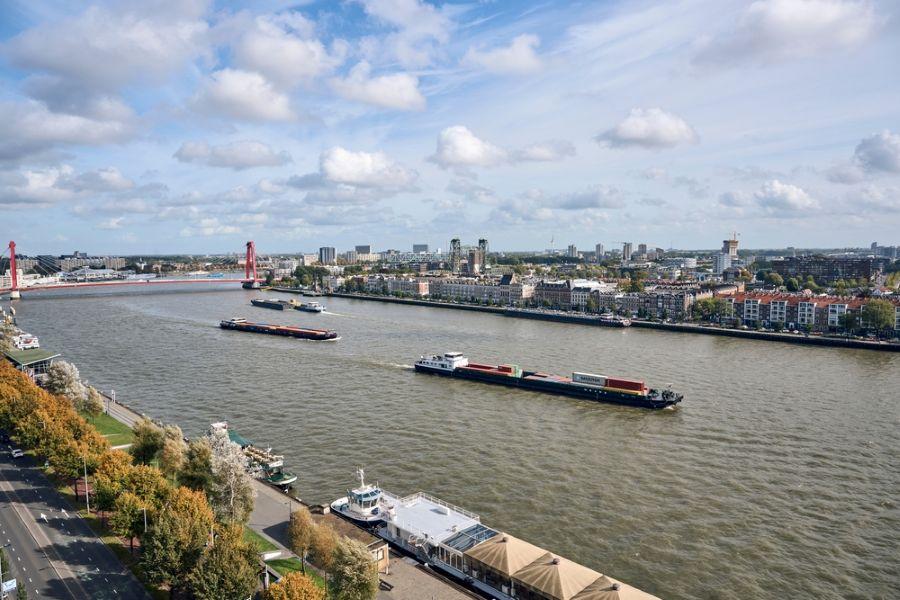TRANS2 for more future-proof waterways
How can inland shipping adapt to and gain more control over the consequences of a changing climate? Over the past two years, 15 parties have been working on this issue in the TRANS2 research project, led by Deltares; the transition to climate-proof and sustainable Rotterdam hinterland transport. Transport by water faces major challenges, from labour market shortages to the energy transition and technological developments. Outdated bridges and locks and longer periods of low or high water also regularly cause delays.

Dry years such as 2018 and 2022 show that the economic and social impact is enormous when there is insufficient transport capacity on the waterways. With the expected increase in low water levels in rivers in the future, climate adaptation is crucial for a future-proof infrastructure.
Indispensable modality
Ageing and maintenance of infrastructure – such as locks and bridges – regularly causes blockages. There are also increasing limitations in the transport capacity of inland shipping due to periods of extremely low water, but also due to high water, heat and extreme weather. Freight transport cannot adapt to this on an ad hoc basis, sometimes resulting in major damage.
If the switch to another mode of transport is made, for example to road transport, the transport does not always return to the water afterwards, which is contrary to (European) policy agreements. Developments and experiences in recent years show that there is now a need for a robust, reliable and efficient transport system.
‘Transporting goods by water is a very clean and, due to the large volumes, indispensable modality,’ says project coordinator Rolien van der Mark, expert in river science and inland shipping at Deltares. ’This mode of transport will continue to be necessary in the future and cannot all be done by road or rail. At the same time, we are now facing complex challenges: rising sea levels, high water, soil erosion, freshwater availability, pressure on free space, inland shipping, biodiversity and nature restoration; all these challenges require adaptation of the water system, and tough choices must be made.’

TRANSition to a climate-proof and sustainable TRANSport
Because multiple measures are conceivable and the interests at stake are significant, it was necessary for the sector and the national government to determine the effectiveness of the various measures and how they interact. That is why the TRANS2 project was set up, co-financed by TKI Deltatechnologie from the PPP (public-private partnership) innovation programme grant from the Ministry of Economic Affairs. Over the past two years, fifteen partners have explored climate-adaptive solutions in this project, coordinated by Deltares.
TRANS2 stands for TRANSition to a climate-proof and sustainable Rotterdam hinterland TRANSport and focused on the question: how can inland shipping gain more control over a changing climate? It is clear that (major) infrastructural changes to the waterway network alone, such as the construction of weirs and lock complexes, the installation of pumps, water buffering in reservoirs, the construction of (lateral) canals and the lowering of lock thresholds, will not solve the low water problem because:
*Their effectiveness is limited (we simply cannot make water)
*The decision-making and construction processes take a long time
*The spatial integration is sometimes difficultSolutions for the shipping function sometimes conflict with other river functions such as flood protection, stability of structures or nature
*International agreements or legislation do not allow everything
*Adjustments to the waterways can be undesirable due to other tasks.
That is why, in addition to adjustments to the infrastructure and the waterway network, more was needed and a search was made for climate-adaptive solutions throughout the entire transport chain of the fleet, logistics, information provision and even broader.
What has been the result?
Various parties such as inland shipping entrepreneurs, industry associations, knowledge institutes, government (ministry and waterway authorities) and port authorities brought their knowledge and experience together in TRANS2.
Now that the project has been completed, Rolien van der Mark has identified three possible solutions for inland shipping: a different fleet, logistical adjustments and better provision of information. ‘This involves information for the short term, such as how low the water level will be in five days’ time, but also further ahead, in order to be able to make strategic choices.’
Future fleet
During the project, the question arose as to how the fleet will develop in the future. Smaller vessels currently fulfil an important role in making transport by water robust, but it is uncertain whether these ships will remain in service in the future. Within TRANS2, a start has been made on investigating this trend and its consequences. This question is of great concern to the sector and is also being addressed by the Inland Shipping Table.
Download eindresultaten en doorkijk TRANS2
Recommendations
Recently, the project Joint Robustness: Ideas for Inland Shipping Logistics (GRIB) was also completed at SmartPort. This project identified promising ideas for further research and innovation directions for climate-adaptive inland shipping. Because there is some overlap in scope and content between TRANS2 and GRIB, it is necessary to consider the findings of both projects together when defining the next steps. The report has already made a start on this, with the following recommendations, among others:
- Further development of the Digital Twin Waterways, in particular regulating ownership and coordination of the tool.
- Depending on the results of the current study by the Inland Shipping Table, there may be a need for more in-depth or broader research into the composition of the fleet.
- Another promising line of research is the role of inland shipping in the transport of new energy sources (such as ammonia). So far, research has mainly focused on the role of inland shipping as a demand party for new energy sources, or on the import of energy sources in the port. The transport of these substances presents both an opportunity and a challenge for inland shipping. SmartPort is organising a round-table discussion with potential partners to address this issue.
Climate-robust inland shipping requires the commitment of all parties in the chain. The collaboration in TRANS2 has shown how we can work together to achieve this.
Johan Gille, programme manager shipping, Port of Rotterdam Authority
I am most proud of our unifying role in TRANS2, in which we truly collaborated with so many different parties on various topics, with understanding for each other's interests.
Rolien van der Mark, project coordinator and expert in river science and inland shipping at Deltares
Partners
In TRANS2, Deltares cooperates with Copernicos, MARIN, TU Delft, Rotterdam School of Management / Erasmus, NPRC, Danser, Koninklijke Binnenvaart Nederland, Smartport, EICB, Port of Rotterdam, Port of Amsterdam, Witteveen + Bos, Rijkswaterstaat and the Ministry of Infrastructure and the Environment (Directorate-General for Civil Aviation and Maritime Affairs, DGLM).

